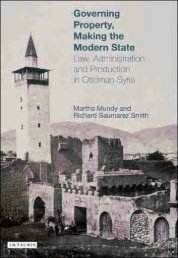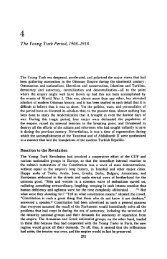The Invention of Tradition as Public Image in the Late ... - PSI424
The Invention of Tradition as Public Image in the Late ... - PSI424
The Invention of Tradition as Public Image in the Late ... - PSI424
Create successful ePaper yourself
Turn your PDF publications into a flip-book with our unique Google optimized e-Paper software.
INVENTING TRADITION AS PUBLIC IMAGE 23<br />
<strong>The</strong> title <strong>in</strong> <strong>the</strong> British c<strong>as</strong>e w<strong>as</strong> borrowed from Mughal India.79 It might be<br />
<strong>in</strong>terest<strong>in</strong>g to speculate on <strong>the</strong> orig<strong>in</strong>s <strong>of</strong> <strong>the</strong> term<strong>in</strong>ology <strong>in</strong> an Ottoman<br />
context. Possibly <strong>the</strong> term had pre-Islamic, Central Asian antecedents. It<br />
might also be <strong>in</strong>structive to determ<strong>in</strong>e when <strong>the</strong> Ottomans started us<strong>in</strong>g this<br />
imagery <strong>in</strong> relation to <strong>the</strong> Hicaz because this is a c<strong>as</strong>e <strong>in</strong> which <strong>the</strong>re are<br />
def<strong>in</strong>ite resemblances to "<strong>the</strong> Holy Land Tyrol" or <strong>the</strong> "Holy Russian Land"<br />
<strong>in</strong> Hobsbawm's example.80 As with <strong>the</strong> Hicaz, <strong>the</strong>re are frequent references <strong>in</strong><br />
<strong>the</strong> Ottoman documents to <strong>the</strong> "Holy name <strong>of</strong> <strong>the</strong> Sublime State" (Ism-i<br />
kaddes-i Devlet-i Aliyye). When one considers that accord<strong>in</strong>g to cl<strong>as</strong>sical<br />
Islamic jurisprudence, any believer had <strong>the</strong> right to acquire property <strong>in</strong> <strong>the</strong><br />
Holy Lands <strong>of</strong> Islam, this exclusionist approach is all <strong>the</strong> more strik<strong>in</strong>g.<br />
<strong>The</strong> same exclusionism and <strong>the</strong> attempt to monopolize sacrality is seen <strong>in</strong><br />
<strong>the</strong> issue <strong>of</strong> <strong>the</strong> pr<strong>in</strong>t<strong>in</strong>g <strong>of</strong> <strong>the</strong> Holy Qu'ran. On 16 September 1897, <strong>the</strong><br />
M<strong>in</strong>ister for education, Zuhdu Paa, sent a memorandum to <strong>the</strong> <strong>of</strong>fice <strong>of</strong> <strong>the</strong><br />
;eyhulislam, report<strong>in</strong>g that Muslim subjects <strong>of</strong> Iran and Russia had made<br />
<strong>of</strong>ficial applications for <strong>the</strong> pr<strong>in</strong>t<strong>in</strong>g and sale <strong>of</strong> <strong>the</strong> holy book.81 <strong>The</strong> M<strong>in</strong>ister<br />
reiterated that <strong>the</strong> law <strong>of</strong> 1276 (1859-60) expressly forbade <strong>the</strong> importation<br />
and sale <strong>of</strong> Qu'rans com<strong>in</strong>g from Iran: "It is well known that <strong>the</strong> Iranians have<br />
been br<strong>in</strong>g<strong>in</strong>g <strong>in</strong> copies <strong>of</strong> <strong>the</strong> Holy Qu'ran <strong>in</strong>to Ottoman dom<strong>in</strong>ions, particularly<br />
<strong>the</strong> Seat <strong>of</strong> <strong>the</strong> Caliphate, Istanbul (Dar ul-Hilafet-i Aliyye). Here <strong>the</strong>y<br />
secretly pr<strong>in</strong>t <strong>the</strong>m and circulate <strong>the</strong>m. It is quite unnecessary to rem<strong>in</strong>d you<br />
that this practice is strictly forbidden." Although it might be understandable<br />
that <strong>the</strong> Sunni Ottoman state should be wary <strong>of</strong> Qu'rans produced by Shifite<br />
hands, <strong>the</strong> same <strong>in</strong>terdict applied to Qu'rans emanat<strong>in</strong>g from Sunni Kazan,<br />
and even <strong>the</strong> land <strong>of</strong> <strong>the</strong> Al Azhar, Egypt: "<strong>The</strong> importation <strong>of</strong> Qu'rans . . .<br />
com<strong>in</strong>g from Egypt is likewise forbidden accord<strong>in</strong>g to state regulations (kavaid),<br />
and practices (usul) stemm<strong>in</strong>g from olden times . ." (m<strong>in</strong> el-kadim).82<br />
Of course, by <strong>the</strong> "practice stemm<strong>in</strong>g from olden times," Ziihdu Paa<br />
w<strong>as</strong> th<strong>in</strong>k<strong>in</strong>g back no fur<strong>the</strong>r than 1859. <strong>The</strong> historically specific character <strong>of</strong><br />
<strong>the</strong> Ottoman practice comes out very clearly fur<strong>the</strong>r on <strong>in</strong> <strong>the</strong> memo:<br />
Although it seems <strong>in</strong>auspicious to forbid <strong>the</strong> pr<strong>in</strong>t<strong>in</strong>g <strong>of</strong> Qu'rans to one who is <strong>of</strong> <strong>the</strong><br />
Sunna, if we open this door it will mean that we will be open<strong>in</strong>g it to any Muslim from<br />
Kazan or India or Algeria .... This will mean unforeseeable dangers for <strong>the</strong> Holy<br />
Word which h<strong>as</strong> survived untarnished for some thirteen hundred years. Particularly<br />
s<strong>in</strong>ce <strong>the</strong>se are troubled times <strong>in</strong> which <strong>the</strong> foreigners' calumnious views regard<strong>in</strong>g <strong>the</strong><br />
Holy Word multiply .... <strong>The</strong> matter may go well beyond <strong>the</strong> pr<strong>in</strong>t<strong>in</strong>g <strong>of</strong> Qu'rans and,<br />
God forbid, create untold complications for <strong>the</strong> Sublime State.83<br />
79 Bernard Cohn, "Represent<strong>in</strong>g Authority <strong>in</strong> Victorian India," <strong>in</strong> Hobsbawm and Ranger,<br />
Invented <strong>Tradition</strong>s, 174.<br />
80 Hobsbawm, Nations and Nationalism, 49.<br />
81 BBA Y.A RES 93/38 Memorandum by M<strong>in</strong>ister <strong>of</strong> Education. Ziihdu Paa to <strong>the</strong> <strong>of</strong>fice <strong>of</strong><br />
<strong>the</strong> $eyhiilislam. 20 Receb 1315/ 16 December 1897.<br />
82 Ibid.<br />
83 Ibid.<br />
This content downloaded from 194.27.149.45 on Wed, 15 May 2013 04:39:11 AM<br />
All use subject to JSTOR Terms and Conditions












